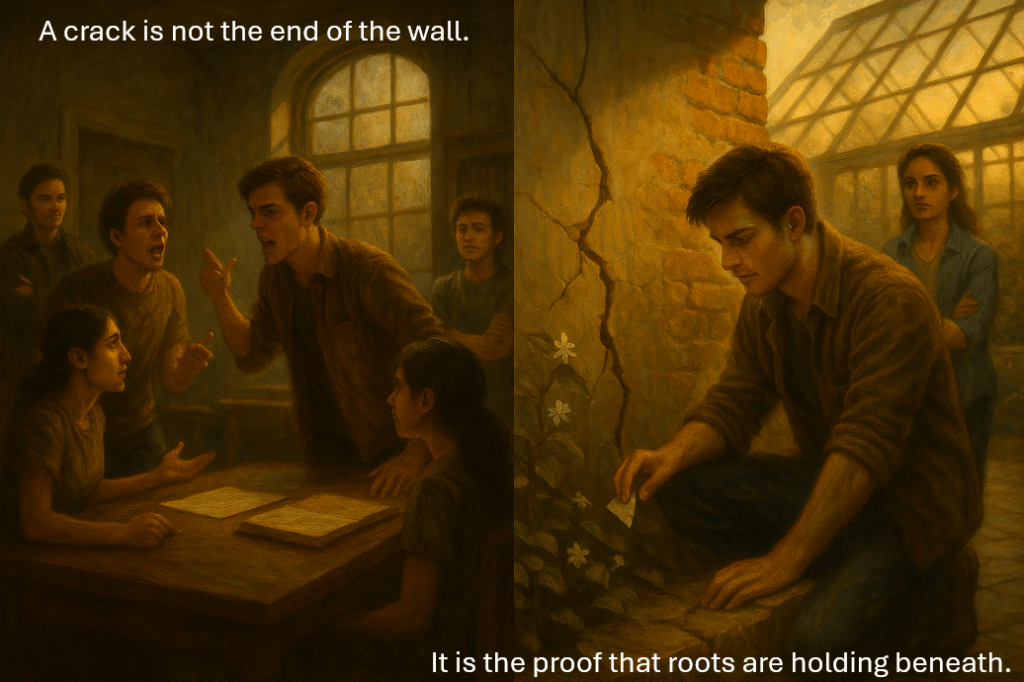
The school courtyard buzzed with the energy of late spring, where the air carried the faint scent of blooming jasmine and the sharper tang of anticipation. Banners fluttered from the bulletin boards, announcing new club initiatives: a robotics competition promising gears and glory, an art festival envisioning canvases and creativity. But beneath the excitement lay a quiet fault line—the limited space in the multipurpose hall. Only one event could claim it, and the choice threatened to fracture the fragile peace the Greenhouse Accord had sown.
It began innocently enough, during the weekly Forum assembly in the old library. Elias, tall and resolute, stood first, his voice cutting through the murmurs like a stake driven into soil.
“We can’t afford delays,” he said, gesturing to the crowded calendar on the wall. “The robotics competition needs that hall—it’s practical, it builds skills for the future. One decision, made swiftly by the Council, and we move forward. Endless debate will bury us in weeds.”
Nods rippled from the robotics enthusiasts, their eyes gleaming with visions of circuits and victories. But across the table, Sam rose, his face flushed with conviction.
“No,” he countered, his words steady but sharp. “That’s the old way—top-down, exclusive. The Accord demands every voice counts. We vote on it fully, in the Assembly. Art isn’t just decoration; it’s expression, healing. If we rush, we trample what we’ve built.”
The room divided like roots pulling at the earth. Whispers grew into arguments: Efficiency matters! versus Inclusion first! The air thickened, old tensions resurfacing like dormant weeds after rain. Elias’s call for speed echoed Absence Two—vengeance disguised as justice, where haste punished the slow. Sam’s insistence on full participation risked paralysis, feeding Absence Four by ignoring the instincts for timely action.
And then, from the edges of the room, Marco leaned against the doorframe, his smirk a shadow in the afternoon light. He hadn’t spoken in the Forum since the Accord’s drafting, but now he stirred, his voice laced with mock concern.
“Beautiful,” he drawled, clapping slowly. “The great Accord in action—arguing over a room while the real work stalls. But I’ve heard whispers: the Council favors robotics because Elias is on it. Favoritism, hidden in plain sight. If this is your ‘grammar of care,’ it’s already cracked.”
His words landed like sparks on dry tinder. Rumors spread swiftly through the halls—texts buzzing, groups forming. “The Accord is rigged,” some muttered. “It’s just the greenhouse elite deciding for us.” Marco didn’t seize power; he eroded trust, embodying the Absences in a single, sly form: control through division, vengeance in rumor, dehumanization in suspicion, distortion in half-truths.
Emil sat quietly at first, the ledger open before him like a silent witness. His fingers traced Priya’s earlier entry: Irrigation leak repaired by Mateo and Sofia, after disagreement resolved. A simple record, but it held the key—conflict not crushed, but channeled into growth. Grandfather’s words echoed in his mind, from the interlude under the eaves: “Storms do not only test plants. They reveal roots.”
He stood, his voice calm amid the rising noise.
“Marco’s right about one thing—we’re cracking. But not because of favoritism. Because we’re forgetting the soil we stand on.”
The room hushed, eyes turning to him.
“Elias, your speed is strength, but haste can uproot what’s young. Sam, your inclusion is vital, but endless delay starves the vine. This isn’t about choosing sides—it’s about grafting them. What if we share the hall? A combined event: robotics demos intertwined with art installations. Gears painted like sculptures, canvases wired with lights. Not competition, but collaboration. We listen to every voice, but we act with purpose.”
Murmurs shifted from division to curiosity. Elias frowned, then nodded slowly. “It could work—if we plan it right.”
Sam leaned forward. “And everyone votes on the details?”
“Yes,” Emil said. “Guided by the Process Guardian. We don’t silence Marco; we invite him to contribute. This is the Accord—not a throne to fight over, but a garden to tend together.”
Marco’s smirk faltered, his rumors losing fuel in the face of inclusion. The Forum debated, but now with structure: three minutes per voice, uninterrupted. Ideas bloomed—shared themes like Innovation in Bloom, timelines that honored both clubs. By meeting’s end, the vote passed: a unified event, born of compromise.
As the assembly dispersed, Priya bent over the ledger, her pen moving with deliberate grace. This time, she didn’t just record an outcome. She diagnosed the crack like an investigator examining fire and fuel.
Ledger Entry — May 15
Crisis: The First Crack — Dispute over Hall Space
The Symptom: Clash over allocation of the multipurpose hall.
The Disease: The Four Absences.
-
Absence 1 (Exclusion): Favoritism assumed—hall “belonging” to robotics.
-
Absence 2 (Vengeance): The push for hasty punishment of delay.
-
Absence 3 (Dehumanization): Rumors reducing others to “elites” and “outsiders.”
-
Absence 4 (Unheard Cry): Clubs desperate for expression, but unheard.
Investigator’s Response: Applied Accord’s grammar to remove the fuel.
-
Shared event (art + robotics) → heals Exclusion.
-
Joint planning with timelines → heals Vengeance.
-
Open Assembly with equal voice → heals Dehumanization.
-
Weekly forum for grievances → heals the Unheard Cry.
Outcome: A collaboration born of conflict. The trellis wobbled, but held.
The crack was not the break—it revealed the roots holding beneath.
Emil lingered in the library as the last voices faded. The fading light cast long shadows across the floor, stretching toward the ledger. He thought of the greenhouse, where vines bent under weight but did not snap when staked with care. This crack had tested them, revealing not weakness, but resilience.
He closed the book gently, his fingers brushing the cover. The Accord, he realized, was not fragile glass. It was living wood, and living wood bent without breaking.

